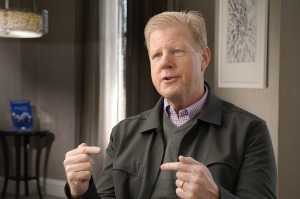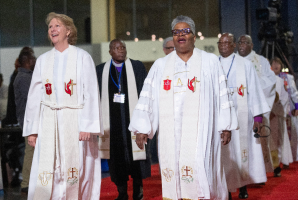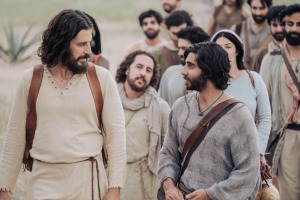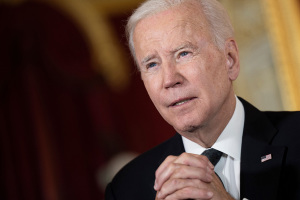Atheist Student Sues School, City Over Prayer Banner
The safety of a sophomore student in Rhode Island has purportedly been threatened due to a prayer banner that is painted inside the school’s auditorium.
On behalf of 15-year-old Jessica Ahlquist, the plaintiff, the American Civil Liberties Union filed a federal lawsuit against the City of Cranston on Monday challenging the constitutionality of the prayer mural.
Beginning with “Our Heavenly Father” and ending in “Amen,” the 8-foot-high, 3-foot-wide banner encourages students to strive academically, show kindness, be honest, display good sportsmanship and conduct themselves as to bring honor to the school.
However, despite the positive message, ACLU volunteer attorneys Lynette Labinger and Thomas Bender argued that the prayer violated the Constitution and excluded students who did not share the same beliefs.
The lawsuit noted that the prayer was designed to be easily read by students attending programs in the auditorium.
“The prayer’s presence in the school promotes and endorses the ideals of Christianity and the concept of a single ‘Heavenly Father,’” asserted Ahlquist in the lawsuit. “I firmly believe that it should not be on display in a public school and is in direct violation of my and other students’ civil rights.”
“As an atheist, I do not feel included in the message of the prayer; in fact, I feel excluded.”
Ahlquist’s father also believes that his daughter should not be subject to a religious communication and display with which she does not agree as a condition of attending public school.
Though the banner has been posted since 1963 – a gift of the first graduating class – controversy was first stirred last July when the local ACLU asked school officials of Cranston West High School to remove the prayer, saying it violated the First Amendment and separation of church and state.
Several Cranston West parents had called the ACLU and objected to the prayer display, leading the school committee to eventually hold several public hearings which resulted in a 4-3 vote to keep the prayer posted on campus, despite warnings about the cost of future litigation.
“The public hearings that I have attended added to [the] feeling that my views and beliefs don’t count, or have less value than those of the Christian majority. I don’t feel that I or anyone else should have to feel that way at school,” Ahlquist said.
The young atheist and another student who spoke against the banner were removed from their regular classroom schedule last month after some students said they intended to harm her due to her opposition.
“It is always difficult to be that one person who steps forward to challenge an exclusionary practice or message and face the majority response,” explained Labinger. “It takes an extraordinary amount of courage for a young person such as Jessica to come forward, in the face of often heated and angry rhetoric, and to demand that her rights be protected, and she deserves the community’s respect for doing so.”
Bender also responded, “Our constitution recognizes that parents have a right to guide the religious upbringing of their children as they believe is best, not according to what the government thinks is best.”
“They entrust public schools with the education of their children, but condition that trust on the understanding that schools won’t advance religious views that conflict with the private beliefs of the student or his or her family,” Bender added.
The executive director of the local ACLU expressed that even the Cranston school district policy succinctly notes, “The proper setting for religious observance is the home and the place of worship.”
But Bishop Thomas J. Tobin, head of the Roman Catholic Diocese of Providence, accused the ACLU of involving themselves in “silly little squabbles” and wrote last month in the diocese’s weekly newspaper that the union should move on to more important issues where civil liberties were really threatened.
“Why would that inspiration offend anyone? Because it begins with a rather generic reference to ‘Our heavenly Father’ and ends with ‘Amen’? The use of our national currency… carries a far more religious sentiment – ‘In God We Trust.’ And I suppose that they hold their ears during the singing of ‘God Bless America,’” Tobin penned.
“The rise and fall of religious faith, Christian or otherwise, in our nation, or even in Cranston, doesn’t depend on the fate of the banner,” he concluded. “If it has to be removed, so be it. Faith will survive and the free practice of religion will go on.”
The ACLU dismissed such arguments and stated that justifying prayers as being merely “ceremonial” or “non-sectarian” only served to trivialize what is, at its core, a deeply religious message.
In a live interview on MSNBC, Allan W. Fung, mayor of Cranston, supported having the banner up and thought it sent an important secular message to many of the students.
He found it unfortunate and disappointing that the ACLU had filed suit against not only the school committee but against the City of Cranston as well, which had no policy input on the decision due to Rhode Island’s laws separating decisions made by the city and school districts.
The Rev. Don Anderson, a Baptist minister and alumnus of Cranston West, on the contrary, approved of the lawsuit and told MSNBC that though he’d like to have a lot more conversation about faith and prayer, his concerns lay in having a state-endorsed prayer and hereby religion. “It crosses the line.”
Until a decision was reached, ACLU attorneys asked the court to prohibit the prayer from being displayed in the presence of students. The city would have to cover the banner in such a way that it could not be easily removed.
They also asked the court to award compensatory damages, including interest, for Ahlquist’s injuries along with attorney’s fees and related costs.
Enlisting the help of Joseph V. Cavanagh Jr., a Rhode Island lawyer, and The Becket Fund for Religious Liberty, the school committee hopes to defend the district.
Fung said city officials had not yet decided if they would retain separate counsel or also turn to The Becket Fund and Cavanagh.
According to school officials, a national Baptist church has offered to help litigation related costs by leading a fundraiser in the meantime.




























